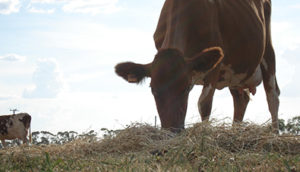Read the latest information on
Foot-and-mouth disease
 In the lead-up to a hot, dry summer, Animal Health Australia (AHA) has joined the call for cattle and sheep producers to consider vaccinating animals against anthrax if they are grazing in or near the nation’s ‘anthrax belt’.
In the lead-up to a hot, dry summer, Animal Health Australia (AHA) has joined the call for cattle and sheep producers to consider vaccinating animals against anthrax if they are grazing in or near the nation’s ‘anthrax belt’.
According to AHA’s Executive Manager, Biosecurity, Dr Simon Humphrys, anthrax “typically occurs in a vast swathe across central NSW, west of the Great Dividing Range, extending into north-west Victoria and southern Queensland.”
“The anthrax belt has been redefined and expanded in recent years, in recognition of the changing risks that come with changing climate conditions.”
Grazing animals will likely show little-to-no signs, simply being found dead in the paddock. Animals which are monitored closely might show signs of depression and fever.
Given that anthrax is notifiable – meaning producers must report suspect cases – in all states and territories, and capable of infecting people (i.e. is zoonotic), Dr Humphrys strongly recommends that producers in the anthrax belt take preventative measures when dealing with sudden stock losses.
“Personal protective equipment is a must whenever you’re dealing with a dead animal, doubly so when you’re not sure what’s killed it.
“Do not handle or move the carcass and seek help from your veterinarian to determine both cause of death and appropriate disposal methods.
“Most importantly, contact your state’s animal health authority and report the case – and keep an eye on your own health in the days following the incident.”
Anthrax spores can exist in soil for decades, leading to outbreaks when the soil is disturbed. This can occur through earthworks, through livestock grazing short pastures or stubble, or following heavy rain. The disease can be spread by wild animals, birds, waterways and carcasses.
“If there’s a history of anthrax cases on the property, there’s a good chance of it reemerging in the hotter and drier weather,” Dr Humphrys explained.
“If you’re in the high-risk area, and with the price of stock, it pays to consult with your veterinarian to work out a management strategy. Vaccination at a minimum is recommended, as well as a contingency plan in the event of an outbreak.”
Producers can report suspicious animal deaths to their state authorities via the Emergency Animal Disease Hotline: 1800 675 888
For more information on preventing diseases in your livestock, visit the Farm Biosecurity website.